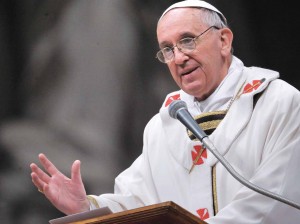 We like happy endings, don’t we? We always want the underdog to win, and sometimes, we can get carried away with it – and hope the story ends the way it should. That’s easier. There’s no lingering dissonance to resolve.
We like happy endings, don’t we? We always want the underdog to win, and sometimes, we can get carried away with it – and hope the story ends the way it should. That’s easier. There’s no lingering dissonance to resolve.
Pressing the pause button on his catechesis on the gifts of the Holy Spirit, Pope Francis reflected on Judas’ betrayal of Jesus for a sum, a price. It is often difficult to hear this in the readings of the mass, let alone see it in movies like the Passion of the Christ. It is difficult for us to see Jesus laying down his life in such a humiliating and degrading way.
In his audience, Pope Francis insisted that we look at this easy exchange of 30 denarii for a life.
“It is a profound wound for us to see suffering and death, especially that of the innocent! … We expect God, in His omnipotence, to defeat injustice, evil, sin and suffering with a triumphant divine victory. Instead, God shows us a humble victory which humanly seems a failure.”
We never get that happy ending, no matter how much we want it.
Jesus’ Resurrection is not the happy ending of a beautiful fable, it is not the happy end of a film, but it is the intervention of God the Father when human hope is shattered. In the moment in which everything seems to be lost, in the moment of grief in which many persons feel the need to come down from the cross, it is the moment closest to the resurrection. The night becomes darker in fact before the morning begins, before the light begins. God intervenes in the darkest moment and resuscitates.
Instead, we are shown how to live out and accept the grief, the pain, and the humiliation. Our Lord knew we would suffer in our lives for years and ages to come. He also knew that we would need to seek Him, to “take the cross in hand and kiss it a lot, a lot and to say: thank you, Jesus, thank you, Lord. So be it.”
Pope Francis provides us with the small task of kissing the crucifix this week, to submit ourselves, our circumstances, our sadness as well as our joy to the will of Our Lord, just as Jesus did in the Mount of Olives. “Father, if you are willing, remove this cup from me; yet, not my will but yours be done.”(Luke 22:42).
It’s this submission of our lives, no matter what the circumstance, to God, that brings true joy. It is in this submission that God saves us. In seeking Him, we triumph over the darkness. Seeking Him, every day, through every circumstance, looking toward an eternity in heaven, is our happy ending.
St. Augustine wrote:
For the good man is neither uplifted with the good things of time, nor broken by its ills; but the wicked man, because he is corrupted by this world’s happiness, feels himself punished by its unhappiness. Wherefore, though good and bad men suffer alike, we must not suppose that there is no difference between the men themselves, because there is no difference in what they both suffer. For even in the likeness of the sufferings, there remains an unlikeness in the sufferers; and though exposed to the same anguish, virtue and vice are not the same thing… And thus it is that in the same affliction the wicked detest God and blaspheme, while the good pray and praise. So material a difference does it make, not what ills are suffered, but what kind of man suffers them.(1)
We must turn to God in our time of strife and bear our pain as He bore His. We can’t compare the tragedies we face with those others do. They have their trials and we have ours. The only thing that matters is that in such times, we ask for God’s help and reach out for His hand. He is our stronghold and will reach back.
“The implication of all this is clear: since He died for us, we also should die for love of Him; or, if we cannot die of love, at least we should live for Him alone.” (St. Francis de Sales p. 181) (2)
During Holy Week, we are reminded how to live and where we should turn when our lives are at their darkest. We are asked to remember Jesus’ Passion, but to keep close His resurrection. It is in His Passion that we remember how God humbles and exalts. (Philippians 2:5-11)
“This week, as we follow Jesus along the way of the cross, may we imitate his loving obedience to the will of the Father, especially in times of difficulty and humiliation, and open our hearts to his gifts of reconciliation, redemption and new life.”
Read the full English translation of the Papal Audience here.
See an excerpt of this week’s Papal Audience here.
1.)The City of God (Book I, Chapter 8) Of the Advantages and Disadvantages Which Often Indiscriminately Accrue to Good and Wicked Men. Revised and edited for New Advent by Kevin Knight. <http://www.newadvent.org/fathers/120101.htm>.
2.) Fiorelli, L. S. (1987). The Passion of Our Lord and What it Means. The sermons of St. Francis de Sales for Lent: given in the year 1622. Rockford, Illinois: Tan Books and Publishers.



